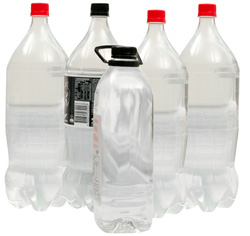Storing water
Note: Newer information on this topic is available on the Get Ready website page - Storing water.

Household water supplies, including drinking water, could be affected in a disaster so having a supply of stored water is absolutely essential. You need at least three litres of drinking water for each person each day. You will also need water for washing and cooking.
You can purchase bottled water or prepare your own containers of water. Purchase food-grade water storage containers from camping or hardware stores or recycle plastic soft drink bottles. Do not use milk containers as protein cannot be adequately removed with washing, and may harbour bacteria.
Instructions for safely storing water
- Wash bottles thoroughly in hot water.
- Fill each bottle with tap water until it overflows.
- Add five drops of household bleach per litre of water (or half a teaspoon for 10 litres) and put in storage. Do not drink for at least 30 minutes after disinfecting.
- Do not use bleaches that contain added scent or perfume, surfactants or other additives - they can make people sick.
- Label each bottle with dates showing when the bottles were filled and when they need to be refilled.
- Check the bottles every 12 months. If the water is not clear, throw it out and refill clean bottles with clean water and bleach.
- Store bottles away from direct sunlight in a cool dark place. Keep them in two separate places and where there is not likely to be flooding.
You can also fill plastic ice cream containers with water, cover, label and keep in the freezer. These can help keep food cool if the power is off and can also be used for drinking.
Your hot water cylinder and toilet cistern are valuable sources of water. Check that your hot water cylinder and header tank are well secured. Do not put chemical cleaners in the cistern if you want to use the water. If you use collected rain water make sure that you disinfect it with household bleach. If you are uncertain about the quality of water, e.g. from a well that has been flooded, or if it might have been contaminated by smoke or volcanic ash, do not drink it.
